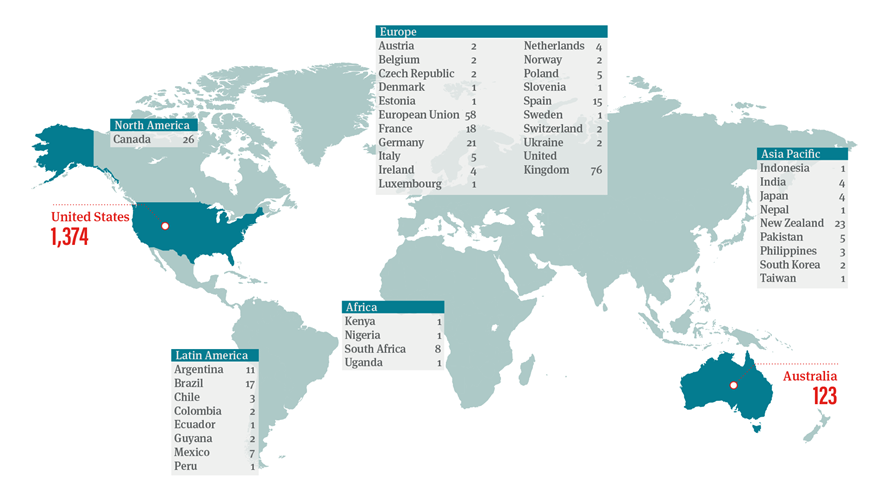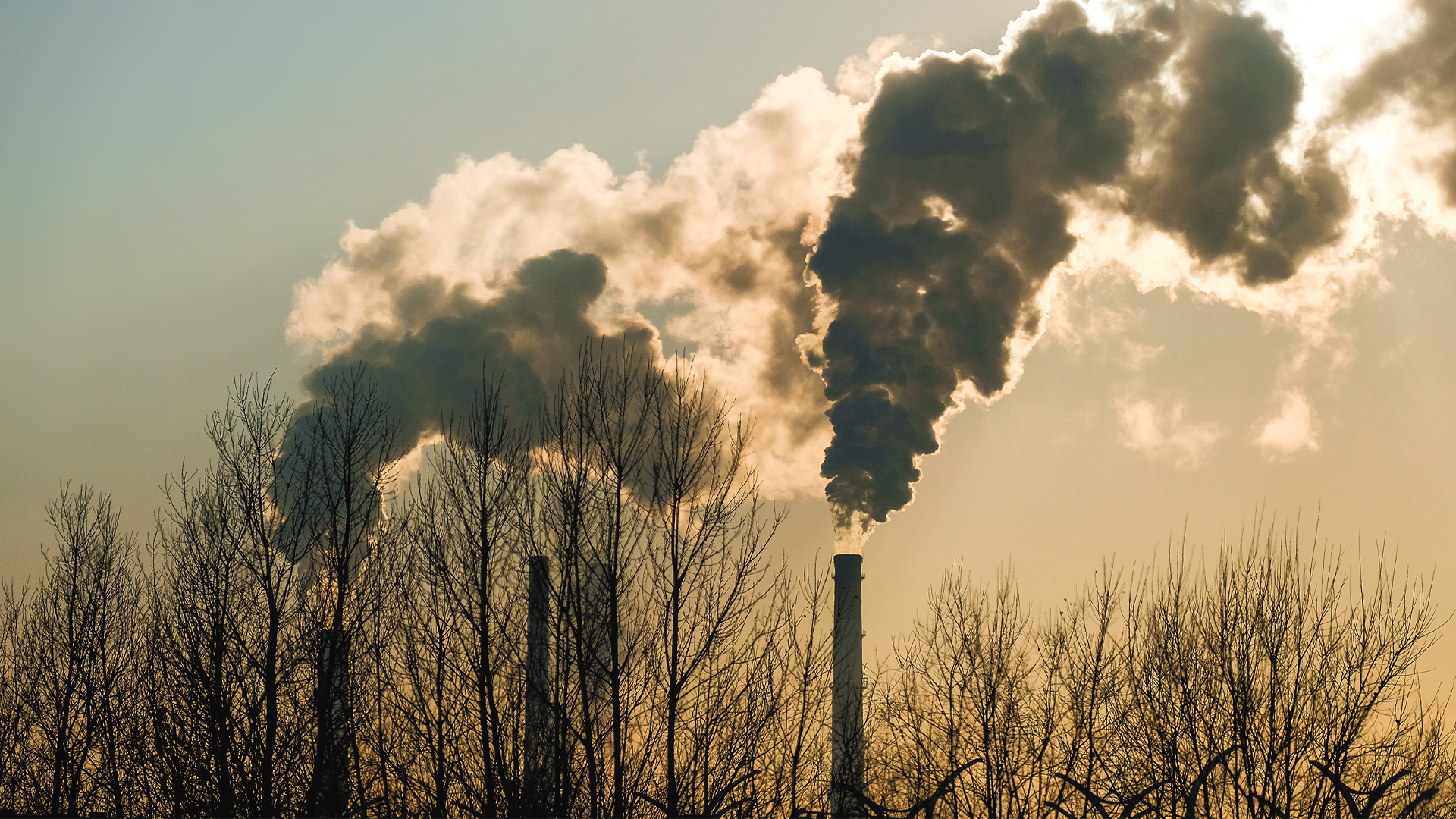Introduction
Climate change litigation is becoming increasingly common across a broad spectrum of actors and industries. Like any litigation, climate litigation can be costly and disruptive for those involved. However, it also poses unique reputational risks for defendants given current community and business focus on environmental, social and governance (ESG) issues, particularly sustainability and climate risk.
Since our last update, the number of climate change litigation actions globally has continued to grow. Strategic climate change litigation cases continue to gain both volume and prominence, targeting a wider variety of private sector actors with more diversity in the arguments being put forward.1 For example, claimants are increasingly relying on constitutional and human rights laws in their attempts to hold governments accountable for addressing climate change.
New types of climate related litigation are also emerging. For example, the Communication to the International Criminal Court regarding President Jair Bolsonaro’s alleged crimes against humanity which was submitted last year on behalf of the indigenous people of the Amazon has the potential to be a landmark decision that makes way for a new international crime of ecocide to be recognised.
Given this evolving legal landscape, it is more important than ever to be aware of the growing body of cases to be able to identify, assess and mitigate risk. Awareness of climate change litigation outcomes can also help businesses develop appropriate policy settings and proactively mitigate their exposure to climate risk.
As at February 2022, the total number of climate change cases filed to date has reached over 1890,2 up from about 1,800 as at July 2021.

This legal update considers key developments and cases since July 2021.
Human rights and constitutional claims
African Climate Alliance et al v Minister of Mineral Resources and Energy et al
In November 2021, three civil society organizations, including the African Climate Alliance (Applicants), instituted legal proceedings in the High Court of South Africa against the South African Government. This case concerns a constitutional challenge to South Africa’s decision to procure 1500 mW of new coal-fired power stations. The respondents in the proceeding are the Minister of Mineral Resources and Energy, the National Energy Regulator of South Africa (NERSA), the Minister of Forestry, Fisheries and the Environment, and the President of the Republic of South Africa.
In September 2020, the Minister of Mineral Resources and Energy made a determination that 1500 MW of new energy capacity will be generated by coal-fired power stations in the next decade (Ministerial Determination), which followed the publication of the revised Integrated Resource Plan (2019 IRP), which set out similar plans. NERSA concurred with the Minister of Mineral Resources and Energy’s determination.
The Applicants have applied to the Court seeking orders that the Ministerial Determination, NERSA’s concurrence with that Determination, and the 2019 IRP are invalid and should be set aside, to the extent that they provide for the procurement of 1500 MW of new coal-fired power stations.
In December 2021, the Minister of Mineral Resources and Energy gave notice that the application would be opposed, contrary to the position of the President who has stated that he will not oppose the application, and will abide by the decision of the court.
Environmental Justice Australia (EJA) v Australia
In October 2021, Environmental Justice Australia (EJA) submitted a complaint to three Special Rapporteurs of the Office of the United Nations High Commission of Human Rights (OHCHR), namely, the:
- Special Rapporteur on Human Rights and the Environment;
- Special Rapporteur on the Rights of Indigenous Peoples; and
- Special Rapporteur on the Rights of Persons with Disabilities.
EJA submitted the complaint on behalf of five young people living in Australia, in relation to “the human rights harms of the Australian government’s Nationally Determined Contribution (NDC) and inaction on climate change”.
The EJA alleges that the Australian government is in breach of the Paris Agreement and UN instruments including the Convention on the Rights of the Child, the Convention on the Rights of Persons with Disabilities, and the UN Declaration on the Rights of Indigenous Peoples. The Special Rapporteurs are requested to intervene to:
- seek explanation from Australia regarding how its NDC is consistent with its human rights obligations; how its current conduct is compatible with a 1.5 degree pathway; and how its current NDC decision-making has involved young people in Australia; and
- urge Australia to set a 2030 target that is consistent with its human rights obligations to young people in Australia and to the complainants.
Waorani community v PetroOriental
In December 2020 a coalition of Ecuadorian NGOs and indigenous Waorani people brought a claim against PetroOriental in the Ecuadorian provincial court of Francisco de Orellana. PetroOriental operates oil drilling on the lands of the Waorani leased to them by the Ecuadorian government.
The plaintiffs argued that the flaring of gas from oil wells operated by PetroOriental is contributing to climate change, and that this violates the rights of nature to have its life cycles protected as well as the constitutional rights of indigenous peoples to a healthy and balanced environment. Both the rights of nature and the rights of indigenous peoples to a healthy and balanced environment are protected under the Constitution of Ecuador 2008.
In April 2021 the judge found that insufficient evidence had been put forward to support the claims. The plaintiffs plan to appeal the decision.
Union of Swiss Senior Women for Climate Protection v Swiss Federal Council and Others
Since our August 2021 update, the Respondent has submitted its reply. The Respondent’s arguments include:
- The body bringing the action cannot be a victim under the European Convention on Human Rights (ECHR) as it is a legal entity that does not enjoy human rights;
- the case attempts to circumvent the Paris Agreement by requiring Switzerland to reduce its emissions by judicial means, taking the ECHR outside its competence, which is solely to decide on the Convention;
- That causation has not been demonstrated by the applicants between the omissions of the Respondent and the effects of heat on the rights of the applicants or that climate change places them in immediate danger; and
- In ratifying the Paris Agreement and setting out commitments to reduce emissions in its NDC the Respondent is taking reasonable and appropriate measures to protect these rights.
The applicants in their reply argue:
- The requirement to grant standing to victims should be interpreted broadly to recognise collective victims.
- The Paris Agreement does not intend to undermine human rights obligations, and that these subsist notwithstanding the Paris Agreement.
- The scientific evidence submitted demonstrates a causal link between greenhouse gas emissions and the applicant’s rights and that the participation of multiple states in climate change does not preclude the respondent being held partly responsible.
- That Switzerland’s NDC is not consistent with a 1.5°C pathway as claimed and that there are further measures open to the Respondent including to prevent emissions occurring abroad that are directly or indirectly within the control of the Respondent.
Third party interventions from the International Commission of Jurists and the European Network of Human Rights Networks have also been filed.
Tort law
Pabai Pabai and Guy Paul Kabai v Commonwealth of Australia
In October 2021, First Nations leaders from the Gudamalulgal Nation of the Torres Strait Islands commenced class action proceedings in the Federal Court of Australia, against the Commonwealth of Australia. The proceedings are brought by the applicants on their own behalf and on behalf of all persons of Torres Strait Islander descent who, from about 1985 and continuing, have suffered loss and damage due to Australia’s inaction on climate change.
The applicants claim that Australia owes them a duty of care, relying on factors including special vulnerability, an “extremely significant” degree of harm, control, assumption of responsibility, knowledge, and reasonable foreseeability. It is alleged that, in breach of that duty, Australia has failed to take reasonable steps to avoid injury and harm to Torres Strait Islanders and implement necessary mitigation and adaptation measures. That breach is said to have caused loss and damage, including environmental degradation, loss of customs and traditions, and loss of native title rights. It is pleaded that the ongoing breach of the duty of care will cause an increase in emissions, a material contribution to the impacts of climate change, and physical and psychological injury to Torres Strait Islanders.
The proceedings are pending before the Federal Court, with the Respondent ordered to file its Defence by 25 February 2022 and a further judicial case management hearing listed for March 2022.
Bushfire Survivors for Climate Action Incorporated v Environment Protection Authority
In August 2021, the New South Wales (NSW) Land and Environment Court (NSWLEC) ruled in favour of Bushfire for Climate Action Incorporated (BSCA), finding that the Environmental Protection Agency (EPA)has a duty to ensure the protection of the environment from climate change under the Protection of the Environment Administration Act 1991 (POEA Act). This landmark decision arose out of objections made by the BSCA to the EPA’s Climate Action Policy. The BSCA sought an order to compel the EPA to “develop environmental quality objectives, guidelines and policies to ensure environment protection” under the POEA Act.
The BSCA argued that ‘environment protection’ includes protection from climate change, contending that the duty conferred by the POEA Act demands that the EPA develop instruments to protect NSW from the effects of climate change. The BSCA also argued that the duty is specific in nature and allows for the setting of mandatory emissions reduction targets.
The EPA denied that that it was under an obligation to develop instruments to protect the environment from climate change, or that it had breached a duty to do so, arguing that if there was any such duty, it was satisfied by other instruments incidentally regulating greenhouse gas (GHG) emissions.
Although the Court confirmed that the EPA has a duty to protect the environment from climate change, the judge made clear that this duty did not require that the instruments contain the level of specificity contended for by the BSCA. EPA is now seeking to appeal this decision.
Sharma v Minister for the Environment
Since our August 2021 update, the Minister for the Environment has filed an appeal against the Federal Court’s decision handed down on 8 July 2021.
In that decision, the Federal Court declared that "The [Minister] has a duty to take reasonable care . . . to avoid causing personal injury or death to persons who were under 18 years of age and ordinarily resident in Australia… arising from emissions of carbon dioxide into the Earth’s atmosphere."
The appeal, filed on September 13, 2021, submitted that the decision of whether the coal mine expansion should have been approved is a discretionary decision involving policy considerations. Accordingly, pursuant to the separation of powers, the Executive is best placed to decide on the regulation of GHG emissions and no novel duty of care should be recognised. The appeal also questioned whether approval of the extension would lead to a net increase in global GHG emissions.
Despite the Federal Court’s recognition of the Minister’s duty to take reasonable care, the expansion was approved on 15 September 2021.
A judgement is yet to be handed down from a hearing in the Full Federal Court in respect of the Minster for the Environment’s appeal.
Consumer protection
Lawyers for Climate Action Complaint to the Advertising Standards Board
In July 2021, the New Zealand Advertising Standards Complaints Board (ASA) upheld in part, a complaint about a television and YouTube advertisement for Firstgas Group (Firstgas). The Board found the advertisement was misleading because it made environmental claims which had not been substantiated.
The action was initiated by activist group, Lawyers for Climate Action NZ against energy company Firstgas over an advertising campaign concerning “zero carbon gas”. The television advertisement for Firstgas, which was also available on YouTube, showed different images of people using gas for cooking and heating hot water. A voiceover said: “New Zealand’s heading towards zero carbon so we’re ensuring our gas is going zero carbon too. You know what that means for you? Absolutely nothing. You can continue doing what you love. And help change the world, without changing too much of yours. Find out more at gasischanging.co.nz”.3
The complaint alleged that the advertisement states, without qualification, that Firstgas is ensuring its gas is going zero carbon, and that consumers were misled to believe that its gas may be carbon neutral.
The Complaints Board upheld the complaint in part. The Board found Firstgas’ claims were misleading as there was no substantiated evidence that they would produce zero carbon gas soon. However, the majority rejected the claim that the advertisement encouraged environmental damage or was in breach of the principle that advertising should "be prepared with a due sense of social responsibility.
Complaint to the Dutch Advertising Committee regarding Shell advertisements
In August 2021 the Dutch Advertising Committee (Reclame Code Commissie) (Committee) found that advertisements in the Shell campaign “Make the difference. Drive CO2 Neutral” were unlawful. The complaint that lead to the Committee’s ruling was made by nine law students. The students claimed that by promoting the compensation of CO₂-pollution caused by its fossil fuel products, Shell did not meet the requirement set out in Article 3 of the Environmental Advertisement Code (Milieu Reclame Code) (MRC), which is that environmental claims in advertisements must be demonstrably accurate.
Ultimately the Committee found that the advertisements about compensation were contrary to Article 3 of the MRC. Further, it was found that the statements regarding compensation were contrary to Article 2 of the MRC, which provides that environmental claims must not mislead the consumer about environmental aspects of the advertised products or about the advertiser's contribution to maintaining and promoting a clean environment in general.
The Committee agreed with the students that Shell could not prove that it was fully offsetting CO₂-pollution caused by its fossil fuel products. The Committee stated that Shell should have demonstrated that the effect of the compensation can be measured so precisely that the measurement can serve as a basis for the claim that by paying one extra cent per litre the adverse effect on the environment with regard to the use of the refuelled fossil fuel is guaranteed to be eliminated.
Barbara Metz et al., v Wintershall Dea AG
An action against German energy company, Wintershall Dea AG (Wintershall) was filed in October 2021, by plaintiffs, Barbara Metz, Sascha Müller-Kraenner, and Jürgen Resch. The claims are based on the Paris Agreement and the German Climate Protection Act, and argue that Wintershall had violated the fundamental right to climate protection and encroached on the plaintiffs’ rights and freedoms by not complying with a fair carbon budget. The plaintiffs also rely on Neubauer et al. v Germany, contending that Germany had limited its total emissions budget of carbon dioxide emissions at its disposal.
The plaintiffs are seeking to refrain Wintershall from (i) extracting natural gas and/or crude oil that emits more than 0.62 Gt carbon dioxide (natural gas) or more than 0.31 gigatonne carbon dioxide (crude oil) when burned (calculated as of 1 January 2021), unless Wintershall can establish that the greenhouse gas neutrality for the carbon dioxide emissions exceeds this amount, and (ii) opening new oil or gas fields after 31 December 2025 or participating in such openings through equity holdings. The case is currently pending before the Regional Court of Kassel (Landergericht Kassel).
This action was brought against Wintershall after two similar actions were brought against BMW in Barbara Metz et al v BMW, and Merces-Benz in Barbara Metz et al v Mercedes-Benz AG.
Jochims v Oatly Group AB
In July 2021, oatmilk company, Oatley Group AB (Oatly) faced two securities class actions filed in the federal district court of the Southern District of New York, alleging that Oatley, and its officials and directors, had failed to disclose adverse facts, artificially inflated share prices, and made false statements deceiving public investors.
The claims alleged that Oatley had had inflated share prices between the initial public offering in the United States of America in May 2021 and July 2021. The claims were based on a short seller’s report alleging several improprieties at Oatley, including improper accounting practices and greenwashing. The complaint alleged that Oatley had included misleading statements regarding greenhouse gas emissions and energy consumption concerning its product, in the registration statement filed with the Securities and Exchange Commission and in an investor presentation.
The United States District Court of the Southern District of New York however dismissed the open motions and required amended complaints, and motions to be appointed lead plaintiff and lead counsel, to be submitted. As at the date of this update, no amended motions appear to have been lodged.
Failure to disclose
Australasian Centre for Corporate Responsibility v Santos Limited
On 25 August 2021, the Australian Centre for Corporate Responsibility (ACCR), a shareholder advocacy group, filed an originating application in the Federal Court of Australia against Santos Limited (Santos), a natural gas supplier.
ACCR has claimed that Santos has engaged in “greenwashing” in their 2020 Annual Report, and in doing so have breached section 18 of the Australian Consumer Law and the Corporations Act 2001 (Cth) and section 796C of the Corporations Act 2001 (Cth). Specifically, ACCR refers to allegedly misleading representations made by Santos that natural gas is “clean energy” and “clean fuel”. Further, that Santos has a plan to achieve “net zero” Scope 1 and Scope 2 GHG emissions by 2040 without disclosing a range of qualifications and/or assumptions made to reach this target, and without disclosing that Santos intends to increase its GHG emissions in the short term.
ACCR seeks declarations that Santos has engaged in misleading or deceptive conduct, or conduct that is likely to mislead or deceive, an injunction prohibiting Santos from engaging in the same conduct in the future and an injunction requiring Santos to issue a corrective statement regarding the environmental impacts of its operations.
Abrahams v Commonwealth Bank of Australia
On 26 August 2021 Guy Abrahams and Kim Abrahams as trustees for the Guy & Kim Abrahams Family Trust, filed an application under section 247A of the Corporations Act 2001 (Cth) in the Federal Court of Australia seeking access to all documents created by the Commonwealth Bank of Australia (CBA) in relation to the bank’s reported involvement in seven specified gas and fossil fuel projects (Projects).
Section 247A of the Corporations Act 2001 (Cth) allows shareholders of a company to apply to the Court to make an order authorising the shareholders to inspect the books of the company.
The Plaintiffs particularly sought all documents created by CBA for the purpose of:
- carrying out an assessment of the environmental, social and economic impacts of the Projects;
- carrying out an assessment of whether the Projects are in line with the goals of the Paris Agreement; and
- discharging any obligation or responsibility that any unit, division or employee of CBA has under its internal Environmental and Social Policy (E&S Policy).4
On 4 November 2021, the Court ordered, by the consent of the parties, that CBA provide a more limited scope of the documents sought by the Plaintiffs in their application.
It is anticipated that the Plaintiff’s may bring a substantive claim against CBA if the documents produced demonstrate that the Projects did not satisfy CBA’s E&S Policy.
Administrative law, planning and permitting
KEPCO Bylong Australia v Independent Planning Commission and Bylong Valley Protection Alliance
In 2019 the Independent Planning Commission (IPC) in NSW refused the application of mining company, KEPCO to develop a thermal coal mine. Part of the reasons for refusal included failure to manage Scope 3 greenhouse gas emissions and that the mine would impose inequitable costs on future generations.
KEPCO appealed this decision to the NSWLEC, arguing that the IPC had made 8 legal errors in coming to its decision. One of the legal errors, KEPCO claimed, was that when considering the development’s management of greenhouse gas emissions, the decision maker had erroneously taken into account the NSW Government’s Climate Change Policy Framework and the Paris Agreement. KEPCO argued these were not policies regarding the assessment of greenhouse gasses contemplated by the legislation. The trial judge rejected this narrow construction and ultimately dismissed all grounds of appeal.
In March 2021 KEPCO appealed the decision to the NSW Court of Appeal. The Court of Appeal upheld the decision of the trial judge, including by confirming that the IPC was entitled to take into account the NSW Government’s Climate Change Policy Framework when assessing the development’s management of greenhouse gas emissions.
In October 2021 KEPCO applied for special leave to have the case heard by the High Court of Australia. On 10 February 2022, the High Court declined to grant special leave to KEPCO to appeal.
Nature Conservation Council of New South Wales v Minister for Water, Property and Housing
In October 2021, the Nature Conservation Council of New South Wales filed Class 4 proceedings in the NSWLEC seeking judicial review of the decision to approve the Border Rivers Water Sharing Plan (the Plan). The Plan was approved by the Minister for Water, Property and Housing and was given concurrence by the Minister for Environment. Both Ministers are listed as respondents in the proceedings.
The Nature Conservation Council, represented by the Environmental Defenders Office, are arguing that the decision-makers were required to consider climate change (including future climate change) when deciding whether to approve the Plan. This argument relies on the rights of children and future generations to enjoy and benefit from a healthy and functioning river system. The plaintiff asserts that the decision-makers’ reliance on historical climate data constitutes a failure to properly consider the likelihood of a hotter, drier future and the impacts of climate change on water quality and availability. The plaintiff allege that these failures will have adverse impacts for the Border Rivers, their surrounding floodplains, and downstream rivers and communities.
The plaintiff has asked the NSWLEC to find that the Border Rivers Water Sharing Plan is invalid and must be replaced by a lawful plan.
Greenpeace v The Advocate General (representing the Secretary of State for Business, Energy and Industrial Strategy) et al.
In 2018, the Oil and Gas Authority (OGA) in the UK granted a permit to BP Exploration Operating Company Ltd and Ithaca Energy (UK) Ltd for exploration of the Vorlich Oil Field in the North Sea. The Secretary of State’s decision was to agree that consent should be granted by the OGA. The OGA subsequently granted consent.
Following earlier proceedings in the English courts, Greenpeace launched a substantive challenge to the permit in September 2021 on a number of grounds, including that the environmental impact of not only the project itself but also the consumption of any oil and gas subsequently extracted from the field should have been a relevant environmental consideration in determining whether or not the permit should be granted. Greenpeace lost on all grounds, with Scotland’s highest court ruling that the Government’s decision to grant the permit was in fact lawful.
Greenpeace announced that they are looking to appeal this decision in the UK Supreme Court, although the application to appeal was not made within the deadline. Permission to appeal may still be granted if the Supreme Court considers it equitable to do so having regard to all circumstances.
The court’s conclusion that it was not necessary for the Government to consider the final consumption of oil and gas extracted from the Vorlich field in assessing the environmental impact of the project largely followed previous case law and is not novel, echoing as it does the consistent message from the UK courts to date that the transition to net zero is a political matter for Government and not the courts.
Cox et al v Oil and Gas Authority et al
The OGA has been targeted by climate activists seeking judicial review, in the High Court of Justice of England and Wales, of the OGA’s strategy for UK oil and gas, on the basis that it does not align with the UK’s climate change commitments. The claimants challenged the strategy on multiple grounds, including on the basis of irrationality because the strategy will result in more oil and gas production in the UK and this is inconsistent with the Climate Change Act 2008 and the UK’s “net zero” target.
The complaint was dismissed on both grounds. The Court found that:
- the OGA had had due regard to climate change when consulting on and drafting the Strategy and that balancing various objectives was a matter for the OGA and not the Court;
- it was not evident that the definition would lead to increased greenhouse gas emissions;
- the OGA was not required to take into account Scope 3 emissions (i.e. emissions from the consumption of petroleum products) when formulating its strategy; and
- the OGA was not legally required to take steps, through its Strategy to “undermine (or limit)” the maximisation of “economically recoverable” petroleum.
The Court’s approach in this case was similar to that in Greenpeace v BEIS 1, where the judiciary were deferential to the regulator. This demonstrates again a reluctance by the English and Scots courts to interfere in climate policy and action.
Environmental Victoria v EPA et al
In September 2021, Environment Victoria brought legal proceedings against the Victorian EPA in the Supreme Court, for the EPA’s alleged failure to take into consideration all the relevant environmental laws and practices when reviewing three major coal-burning station licenses.
Environment Victoria argued that the EPA committed jurisdictional error for failing to comply with mandatory requirements in the Environment Protection Act 1970 (EP Act) and the Climate Change Act 2017 (CC Act), by not giving proper, realistic and genuine consideration to the principles of environmental protection set out in the EP Act the relevant provisions of State environment protection policies made under the EP Act, and matters set out in the CC Act, when making the decisions regarding the licences.
Environment Victoria seeks orders that the EPA’s decisions regarding the licences are invalid and of no effect, and an order in the nature of certiorari quashing the decisions.
International criminal law
Communication to the International Criminal Court regarding President Jair Bolsonaro’s alleged crimes against humanity
In January 2021, indigenous leaders on behalf of the Paiter Suruí and Kayapo people of the Amazon filed a communication before the Office of the Prosecutor of the International Criminal Court (Prosecutor’s Office), requesting that the Prosecutor’s Office undertake a preliminary examination into the actions of Brazilian President Jair Bolsonaro in the Amazon.
It is alleged that President Bolsonaro has committed crimes against humanity to indigenous peoples of the Amazon, involving murder, persecution and forced transfer of indigenous people. These alleged crimes against humanity have a broader environmental context, where President Bolsonaro has dismantled environmental policies that have impacted the Amazon.
The Prosecutor’s Office will undertake a preliminary examination if it is satisfied that a case meets the criteria for a further investigation under the Rome Statute of the International Criminal Court. As yet, the Prosecutor’s Office is yet to determine whether it will open a preliminary examination against President Bolsonaro.
This case has the potential to be a landmark decision that makes way for a new international crime - the crime of ecocide - to be recognised.
Conclusion
Climate change litigation is progressing rapidly, reflecting an increasing sense of urgency with respect to avoiding climate change impacts. Human rights is likely to remain an active area for new litigation against both governments and corporations. Other trends include litigation based on compliance with climate commitments, financial and corporate market issues, and issues concerning adaptation to the impacts of climate change.5 We also expect the trend of cases which seek to restrict high emissions activities or developments to continue.
Please contact a member of our climate change team if you would like further information about any of the cases covered in this update, or would like to discuss climate change issues more generally.












